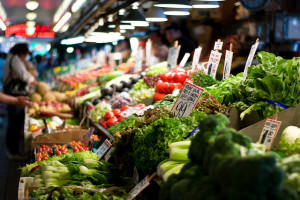Farmers’ Markets as a Means of Education and Community Growth
The growth of the farmers’ market as a source of education about the industrial food system and a means to unite a community.
By: Jackie Marchildon, Staff Writer
Over the last 5 years, farmers’ market locations have increased significantly throughout the GTA, and although there may be different reasons for their expansion, some farmers’ market founders point to community outreach at the forefront of their development. Although the increase in markets shows promise for the local food movement, some caution that there is still more that needs to be done other than just opening new markets in populated neighbourhoods.
“As a destination market, food is an important pillar among many of the experiences here on Saturdays,” says Anthony Westenberg, from environmental charity Evergreen, of their market Brick Works. Westenberg also adds that Evergreen Brick Works Farmer’s Market generated $3.9 million for the local food economy in 2012, and so he points out that the local food shed economy for farmers across Ontario via the Farmers’ Market must in the multi-millions.
Farmers’ markets, like Dufferin Grove and Riverdale, have been around for years, but it’s only recently that markets have increased among varied communities. In 2008, Lesley Stoyan, co-founder of Appletree Markets, was asked to participate in a community initiative to get locals involved with Earth Day in north Toronto. Stoyan explained that Evergreen’s Brick Works market had recently opened, but markets were not very vibrant within the city, so with her husband, she set up a farmers’ market for the initiative. The community loved it, so instead of being a onetime event, the market stuck around and continued to expand. They even opened their second location last year.
Although the community reacted well to the market, Appletree still faced challenges in Toronto’s fast-paced shopping atmosphere. “Educating the public about why you want to really pay attention to where your dollar is going as far as local sustainable food purchasing, has been quite a challenge,” Stoyan explained sincerely. “So that’s been something that we really had to get our head around, really specific market demographic, a really specific marketing campaign for this neighbourhood, so that’s definitely been an obstacle for sure.”
[pullquote]So I think it’s great that there’s been this boom in farmers’ markets, it allows communities to come together with this food hub, they can eat, shop and socialize.[/pullquote]
Despite the challenges faced in getting people excited and involved in local eating, farmers’ market founders agree that more people have opted to shop at farmers’ markets and the accessibility in certain areas has really improved, especially in Toronto.
Stoyan attributes the recent increase to the local food movement. “The local food movement has really become, in my opinion, what the organic food movement was a decade ago.” Stoyan explains that people are now less concerned with organic, as she thinks they are now more interested in making sure they are keeping their food local, “and that’s fantastic. So I think it’s great that there’s been this boom in farmers’ markets, it allows communities to come together with this food hub, they can eat, shop and socialize.”
Diana Gonzalez, Toronto District Supervisor for MyMarket, agrees there are more and more markets popping up around the city. “I think every community would like to have their own green initiatives and many think that opening farmers’ markets is the way to do it, and there are also people that really want them.”
MyMarket is the Certified Local Farmers’ Market brand that was introduced in May 2007 to ensure that farmers are screened and truly local. Although cities take permit fees and smaller markets sometimes charge a vendor’s fee, funds brought in by farmers’ produce go directly to the farmer.































Share the post "Farmers’ Markets as a Means of Education and Community Growth"